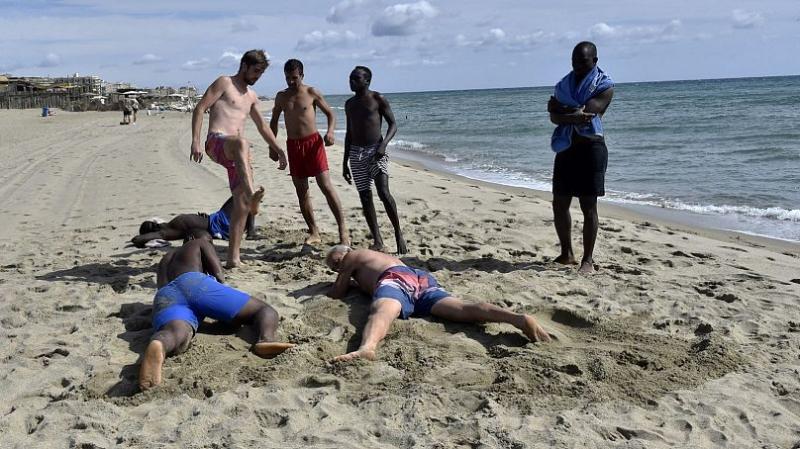Migrants in France learn to swim, and overcome the trauma of their crossing
Those who survived dangerous crossings often fear the water but are now being given lessons to tackle this head on.
Mohamed, a migrant from Mauritania, takes his first steps in the water, accompanied by a lifeguard who helps him overcome a fear born when he risked his life to cross the Mediterranean.
A few metres from the beach umbrellas of holidaymakers at the French seaside resort of Canet-en-Roussillon, migrants are taking their first swims.
On a makeshift boat with 60 passengers, Mohamed spent four days at sea between Morocco and France, trying to reach the coast.
"We were squeezed in with just a rucksack at our feet," recalls the 31-year-old. "I couldn't turn back and go home".
A few months later, he returned to the waters that could have swept him away.
"You can see the evolution in just a few sessions. They've gone from being phobic to having a blast in the water," smiles Corinne Grillet, founder of the Perpignan-based Welcome66 association, which gives swimming lessons to exiles.
In the water, Mohamed tries a few fathoms and lets himself be carried along by the current. Next to him, the laughter of Abdirahman, a 23-year-old Somali, accompanies the rhythm of the waves.
Coming from Somalia, he boarded a dangerously loaded boat to get to France. A month ago, the sea swept away one of his friends who was trying to cross. "The sea is scary," he says.
Delphine Bassols is delighted by the young Somalian's progress. For this former synchronised swimming competitor, giving lessons to young migrants "means giving them a piece of freedom", she explains.
Practice on the beach before going into the water.RAYMOND ROIG / AFPAs for Ali, he doesn't want to go in the water, frightened by the size of the waves. It's out of the question for him to talk about his journey, unlike Souleyman, 28, who left Mauritania to arrive in France a year and two months ago.
I'm not afraid (of learning to swim)," he claims. I had to cross the sea to get to Europe". The young man faced the Mediterranean Sea aboard "a small boat where there were forty-six of us", he confides.
Once in the water, Souleyman finds it hard to hide his concern about the waves. With determined eyes, he follows his teacher's encouragement. "With the waves it's a bit complicated, but it's okay," he says.
"When Souleyman was surfing, I could support his head and feel his tension. He hides (his fear) with laughter," observes Bassols.
Thousands of men and women die at sea every year during their crossing causing psychological damage for the survivors, says Jacky Roptin, psychologist at the Centre Primo-Lévi, a specialist in accompanying migrants.
"This trauma can often be hidden. We tend to imagine trauma specific to what they experienced in their own country. We tend to think, sometimes, that what they experience at sea would be of a lower level of violence", he continues.
It was the anxiety and fear that haunted the young migrants in her association that prompted Corinne Grillet to organise swimming lessons. Two years ago, faced with the reaction of the young people she accompanies to the sight of the sea, Grillet decided to reconcile them with the aquatic environment.
"I thought it was a real shame to live in a region like this and have this apprehension, even phobia, of water," she said.
Share this article
- Share
- Tweet
- Share
- send
- Share
- Tweet
- Share
- send
- Share
- Send
- Share
- Share
- Share
- Send
- Share
- Share
You might also like
Emmanuel Macron insists New Caledonia belongs to France out of choice
Rebound and heal: Why did Paris bid for the 2024 Olympics after extremist attacks?
Macron calls for 'return to authority, starting with the family' after riots
Swimming France Migrationمنبع خبر: یورو نیوز ![]()
اخبار مرتبط: Migrants in France learn to swim, and overcome the trauma of their crossing
حق کپی © ۲۰۰۱-۲۰۲۴ - Sarkhat.com - درباره سرخط - آرشیو اخبار - جدول لیگ برتر ایران

